Fitting a boiler typically requires between 4 to 10 hours of skilled labor, depending on the type of boiler you choose. Combi boilers can take about 4 to 6 hours, while system boilers may take 6 to 8 hours, and conventional models often require 8 to 10 hours due to their complexity. Factors like your home's existing plumbing and accessibility can also affect installation time. You'll find more insights on enhancing your boiler's performance and longevity.
Key insights
- Combi boiler installation typically takes 4 to 6 hours, while system boilers take 6 to 8 hours.
- Conventional boilers require 8 to 10 hours due to extensive pipework and components.
- Accessibility of the installation site can significantly extend project timelines.
- Existing plumbing or electrical setups may need retrofitting, adding to labor time.
- Local building codes can necessitate additional adjustments, impacting overall installation complexity.
Understanding Boiler Types and Their Installation Requirements
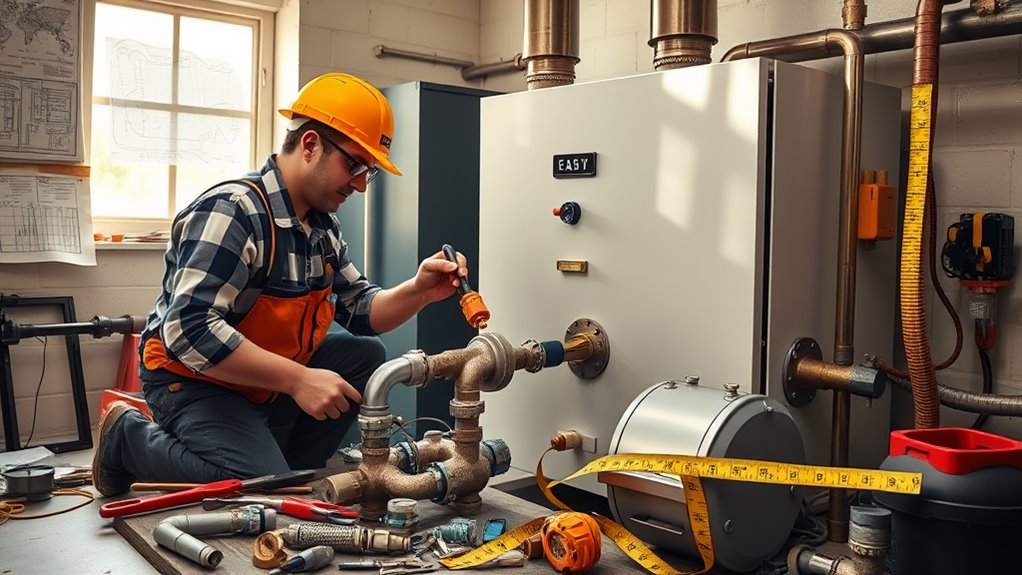
When you're considering a boiler installation, it's vital to understand the various types available and their specific installation requirements. The most common boiler types include combi, system, and conventional boilers. Combi boilers provide both heating and hot water on demand, requiring minimal space and simpler installation. System boilers need a cylinder for hot water storage, demanding more space and specific plumbing connections. Conventional boilers, which consist of a tank and a cylinder, require the most complex installation due to additional components like a cold water storage tank. Each boiler type has unique installation requirements, including flue positioning, power supply, and venting systems, which can greatly affect labor costs and time. Understanding these factors helps you plan your installation more effectively. Additionally, compliance with local building regulations is essential to ensure a safe and efficient installation process.
Assessing Your Home's Existing Heating System
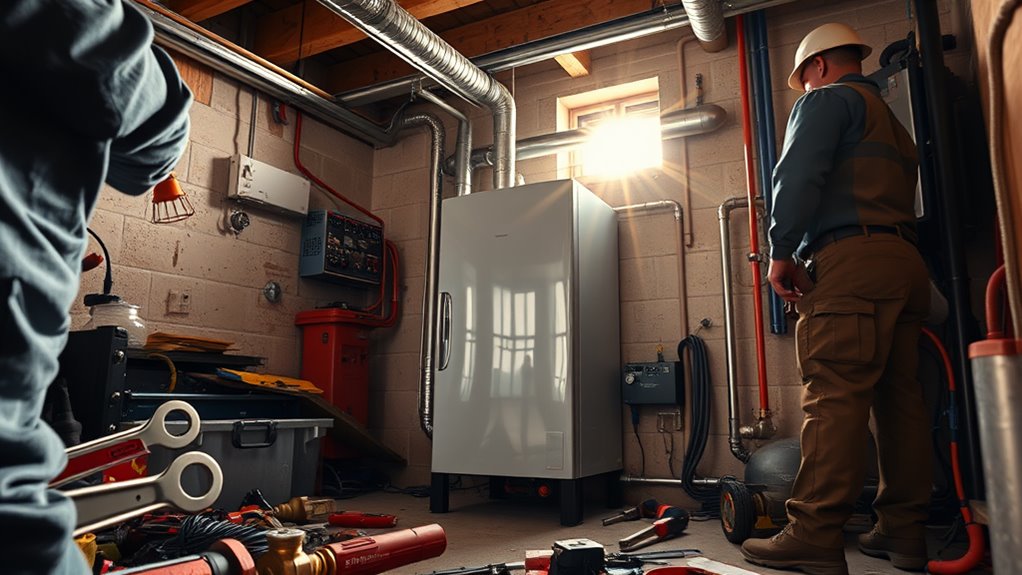
Before you proceed with a boiler installation, reviewing your home's existing heating system is crucial to guarantee compatibility and efficiency. Start by evaluating heating distribution methods, such as radiators or underfloor heating, to determine how well they can work with a new boiler. Next, check the age and condition of your current system components. Older pipes may require upgrading to maintain peak system efficiency. Additionally, consider the insulation levels in your home; poor insulation can lead to energy loss, impacting the new boiler's performance. Finally, review your thermostat and controls to confirm they align with modern standards. This thorough evaluation will help you identify necessary upgrades, making sure your new boiler operates effectively and efficiently in your home. Regular servicing ensures safe and efficient operation, which is vital for maximizing your new boiler's performance.
The Importance of Professional Installation
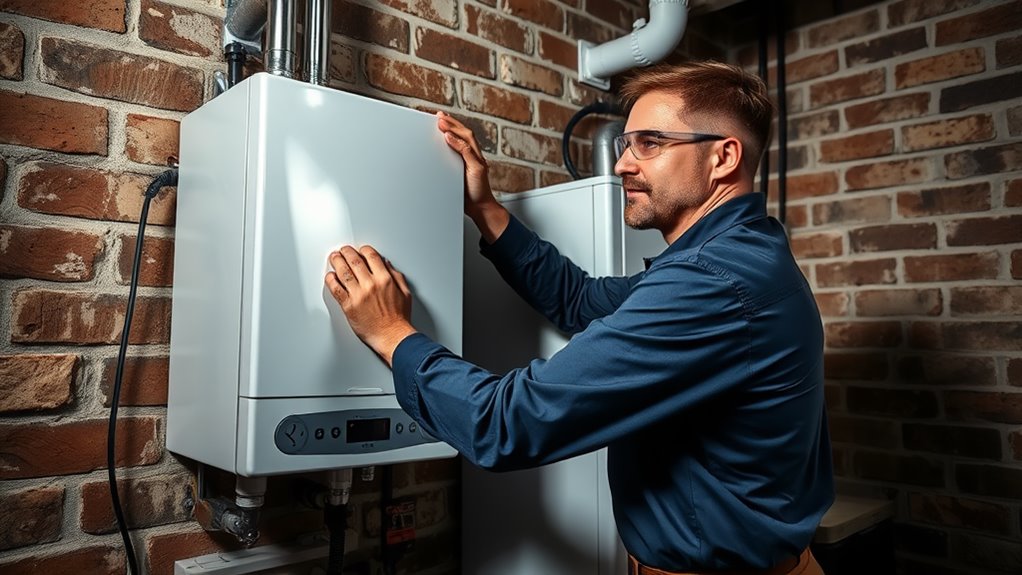
If you want to guarantee your new boiler operates safely and efficiently, professional installation is vital. Hiring a technician with professional expertise guarantees that all components are correctly fitted and calibrated according to the manufacturer's specifications. Their installation experience allows them to identify potential issues, such as improper venting or inadequate water pressure, that could compromise performance. Additionally, they'll adhere to local codes and regulations, safeguarding you from legal complications. With their knowledge of various boiler types, they can recommend the best setup for your home. Ultimately, this investment in professional installation minimizes the risk of breakdowns, enhances energy efficiency, and prolongs your boiler's lifespan, making it a vital step in your heating system upgrade. Furthermore, regular maintenance is essential for optimal condition to ensure the boiler operates at peak efficiency.
Estimating Labour Time for Different Boiler Models
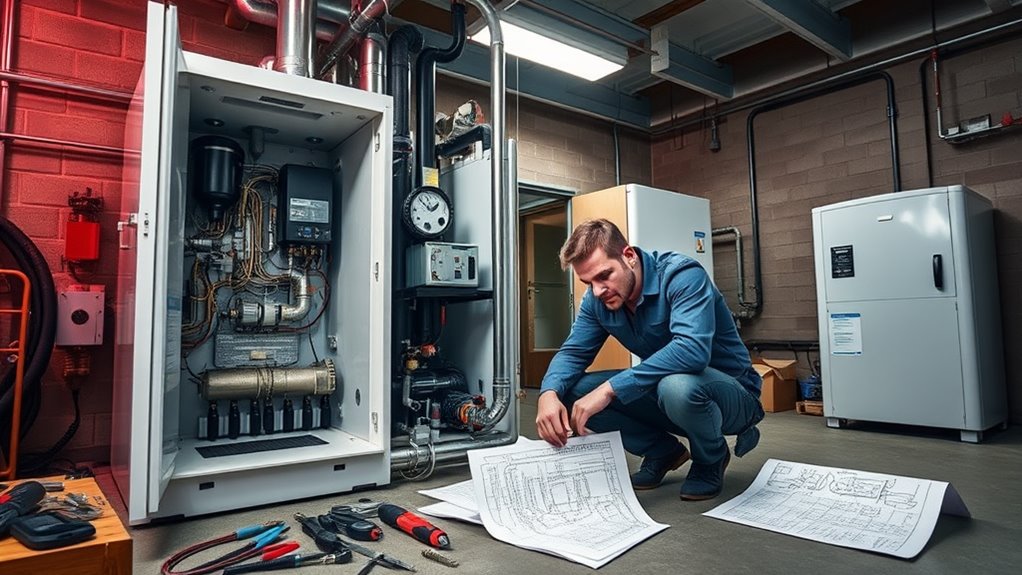
Estimating the labour time for fitting a boiler varies greatly based on the model and its complexity. Different boiler types require different levels of expertise, which affects installation time. Here's a quick overview:
- Combi Boilers: These typically take 4 to 6 hours to install due to their compact design.
- System Boilers: Expect about 6 to 8 hours, as they involve more components and require additional plumbing work.
- Regular Boilers: Installation can take 8 to 10 hours, given the need for a hot water cylinder and more extensive pipework. It's essential to consider preventive maintenance tips, as proper upkeep can influence the efficiency and longevity of your new boiler.
Understanding these general timeframes helps you plan effectively and guarantees you hire the right professional for your specific boiler type.
Factors That Influence Installation Complexity
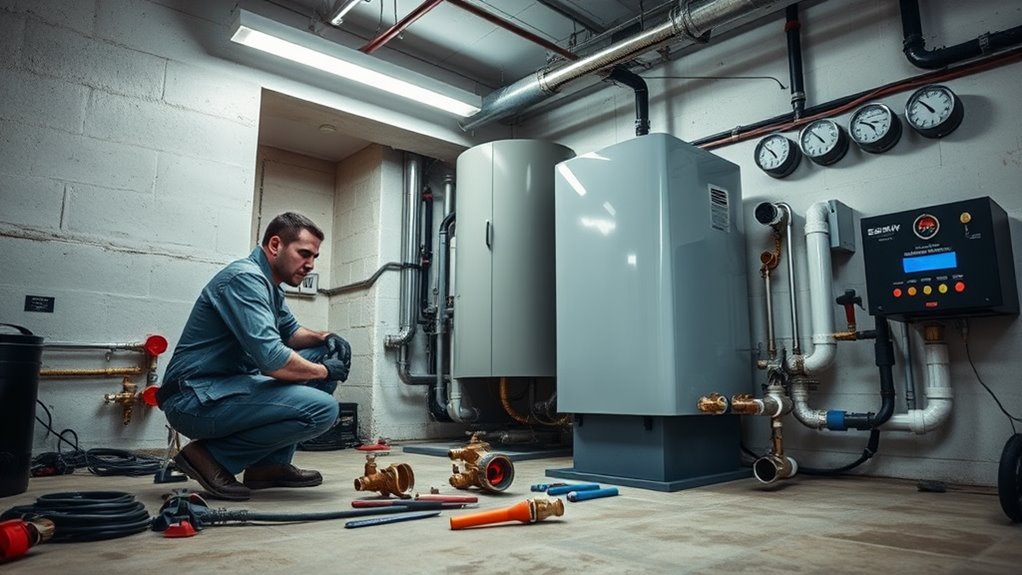
When considering a boiler installation, several factors can greatly impact its complexity and, consequently, the labour required. One significant factor is boiler accessibility; if the installation site is cramped or difficult to reach, you'll face installation challenges that can extend the project timeline. Additionally, the existing plumbing and electrical setup can complicate matters. Older homes may require retrofitting or additional modifications, increasing labour demands. The type of boiler you choose can also influence installation complexity; high-efficiency models often have more intricate venting and piping requirements. Finally, local building codes and regulations may necessitate further adjustments, adding to the overall labour needed for a successful installation. Understanding these factors helps you anticipate potential obstacles during the process. Furthermore, considering the energy-efficient heating systems available, such as heat pumps, can provide additional options that may impact installation complexity.
Necessary Tools and Equipment for Boiler Fitting
Successfully fitting a boiler requires a specific set of tools and equipment to guarantee the installation is efficient and compliant with safety standards. Here's what you'll need:
- Wrenches and Pliers: Essential boiler tools for tightening and loosening fittings, guaranteeing secure connections.
- Pipe Cutters and Benders: Necessary for accurately cutting and shaping pipes, allowing for a precise fit within the designated space.
- Multimeter and Pressure Gauge: Critical installation equipment for testing electrical connections and measuring system pressure, helping to ascertain peak performance. Regular checks can help prevent common error codes that disrupt boiler operation.
Having these tools at your disposal not only streamlines the installation process but also enhances safety and reliability. Make sure you're well-equipped before diving into the task!
Compliance With Building Regulations and Safety Standards
Ensuring compliance with building regulations and safety standards is essential for any boiler installation, as failure to adhere can result in serious safety hazards and legal repercussions. Familiarize yourself with local building codes, which dictate the installation process, required materials, and specific safety measures. These codes are designed to protect you and your property. Before installation, schedule necessary safety inspections to verify that all work meets regulatory requirements. These inspections will help identify potential issues, ensuring your boiler operates safely and efficiently. By following established guidelines, you not only safeguard your home but also avoid penalties or complications during future property transactions. Staying compliant is a significant aspect of a successful boiler installation that shouldn't be overlooked. Additionally, obtaining a Commercial Gas Safety Certificate confirms that your gas appliances meet essential safety standards.
Preparing Your Home for Installation Day
Preparing your home for installation day is essential to guarantee a smooth and efficient process. Follow this pre-installation checklist to confirm everything's ready:
- Clear the Installation Area: Remove any furniture or obstacles from the space where the boiler will be installed. This makes it easier for the technicians to work efficiently.
- Confirm Home Accessibility: Check that the access points, such as doors and hallways, are wide enough for the boiler and equipment. This helps avoid delays.
- Check Utilities: Make sure the gas, water, and electricity supplies are functioning and accessible. This allows for a seamless connection during installation. Additionally, ensuring compliance with safety regulations is crucial to prevent hazards during and after the installation process.
Post-Installation Checks and Maintenance
After installing your boiler, it's essential to verify the system's performance to guarantee everything operates efficiently. You should also establish a routine maintenance schedule to keep the system in peak condition and prevent future issues. Regular checks and servicing will enhance longevity and reliability, safeguarding your investment. Additionally, performing thorough cleaning of the boiler at least once a year can help prevent unexpected breakdowns and ensure peak performance.
System Performance Verification
Once the boiler installation is complete, you must conduct thorough system performance verification to guarantee peak operation. This step guarantees your system efficiency aligns with installation best practices. Here are three critical checks to perform:
- Pressure Testing: Verify that the system operates within the manufacturer's recommended pressure range. This guarantees safety and efficiency.
- Temperature Monitoring: Check the water temperatures at the inlet and outlet. This guarantees the system is effectively heating water as designed.
- Flow Rate Assessment: Measure the flow rate to confirm it meets specifications. Proper flow rate is essential for peak performance. Additionally, ensure that the pressure gauge is monitored regularly to prevent issues like the E119 error code, which indicates low water pressure in the system.
Routine Maintenance Schedule
To guarantee your boiler operates efficiently and safely over its lifespan, establishing a routine maintenance schedule is essential. You'll want to schedule service intervals at least once a year. During these maintenance checks, a qualified technician will inspect critical components, such as the heat exchanger, flue system, and safety controls. They'll also clean filters and check for leaks, ensuring peak performance. Keeping a log of these maintenance visits helps track your boiler's health and can identify potential issues early. Additionally, don't overlook the importance of regular visual inspections you can perform yourself, like checking for unusual noises or leaks. By adhering to a routine maintenance schedule, you can enhance your boiler's efficiency and prolong its operational life.
Cost Breakdown: Labour vs. Materials
While considering the total expenses for fitting a boiler, it is crucial to understand how the costs break down between labour and materials. Typically, you'll find that labour costs account for a significant portion of your budget. Here's a breakdown to help clarify:
- Labour Costs: Expect to pay for the technician's time, which can vary based on expertise and location.
- Materials Pricing: This includes the boiler itself and any additional parts required for installation, such as pipes and fittings.
- Additional Fees: Don't forget potential costs like permits or disposal fees for your old boiler.
Frequently Asked Questions
Can I Install a Boiler Myself to Save on Labour Costs?
You might consider DIY installation to save on labour costs, but it's essential to weigh the risks. Installing a boiler requires specific skills and knowledge of plumbing and gas regulations. If you're not qualified, you could face safety hazards or costly mistakes. Additionally, improper installation can void warranties and affect insurance claims. Carefully assess your expertise and the potential savings before deciding to tackle this project on your own.
How Long Does a Typical Boiler Installation Take?
A typical boiler installation usually takes between 4 to 8 hours, depending on several factors. Boiler types, such as combi, system, or conventional, can influence the time required. If you're replacing an existing unit, it'll generally be quicker than a new installation. Other installation factors include the complexity of your home's plumbing and gas lines, as well as any necessary upgrades to your heating system, which may extend the timeline.
What Qualifications Should My Installer Have?
When choosing an installer, you should prioritize qualifications that guarantee safety and compliance. Look for installer certification, indicating they've completed necessary training. They must also possess Gas Safe registration, which confirms their expertise in handling gas appliances. These qualifications assure that your installation meets legal standards and safety regulations. Always ask for proof of these credentials to protect yourself and guarantee a reliable, efficient boiler installation.
Will I Need to Relocate Any Existing Pipes?
You might need to evaluate pipe relocation when fitting a new boiler. If your current setup doesn't align with the new unit's specifications, relocating pipes can guarantee peak performance. Check your plumbing factors, as elements like pipe size, material, and layout play significant roles. It's important to consult with a qualified installer who can assess your situation accurately, ensuring compliance with local regulations and preventing future issues with your heating system.
Can Installation Times Vary by Season?
Yes, installation times can vary by season due to seasonal demand. During colder months, when demand surges, you'll likely face longer wait times and potential installation challenges. Technicians may have packed schedules, making it harder to secure prompt service. Conversely, in warmer months, you might find quicker installations as demand drops. Being aware of these fluctuations can help you plan your boiler fitting more effectively, ensuring you get the service you need when you need it.
Summary
In conclusion, fitting a boiler involves various factors that can affect labor time and complexity. By understanding your home's heating system and the specific boiler type, you can better prepare for installation. Prioritizing professional installation guarantees compliance with safety standards and regulations. Remember, the balance between labor costs and materials will impact your overall budget. With proper planning and preparation, you can streamline the installation process, guaranteeing a safe and efficient heating solution for your home.

